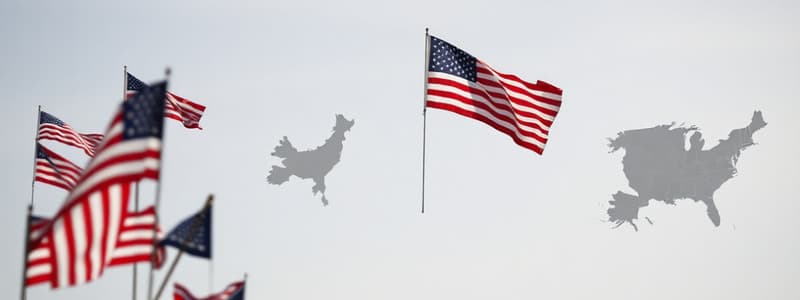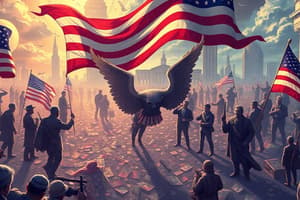Podcast
Questions and Answers
How did the Open Door Policy contribute to U.S. imperialism?
How did the Open Door Policy contribute to U.S. imperialism?
Which of the following statements BEST explains the connection between protective tariffs and U.S. economic nationalism?
Which of the following statements BEST explains the connection between protective tariffs and U.S. economic nationalism?
What is the connection between the sinking of the USS Maine and the Spanish-American War?
What is the connection between the sinking of the USS Maine and the Spanish-American War?
How did the construction of the Panama Canal contribute to U.S. imperialism?
How did the construction of the Panama Canal contribute to U.S. imperialism?
Signup and view all the answers
Why did the United States choose to expand its influence in Asia during the late 19th and early 20th centuries? Select the answer that best reflects the motivations behind American imperialism at the time.
Why did the United States choose to expand its influence in Asia during the late 19th and early 20th centuries? Select the answer that best reflects the motivations behind American imperialism at the time.
Signup and view all the answers
How did Theodore Roosevelt's approach to regulating big businesses differ from the traditional laissez-faire approach prevalent in the 19th century?
How did Theodore Roosevelt's approach to regulating big businesses differ from the traditional laissez-faire approach prevalent in the 19th century?
Signup and view all the answers
What is the connection between the Open Door policy and the United States's growing economic interests in China?
What is the connection between the Open Door policy and the United States's growing economic interests in China?
Signup and view all the answers
Which of the following factors played a significant role in shaping the United States's imperialist ambitions in the late 19th and early 20th centuries?
Which of the following factors played a significant role in shaping the United States's imperialist ambitions in the late 19th and early 20th centuries?
Signup and view all the answers
Which of the following statements accurately describes the impact of Theodore Roosevelt's 'Square Deal' domestic program on American society?
Which of the following statements accurately describes the impact of Theodore Roosevelt's 'Square Deal' domestic program on American society?
Signup and view all the answers
What was the primary political motivation behind Theodore Roosevelt's decision to build the Panama Canal?
What was the primary political motivation behind Theodore Roosevelt's decision to build the Panama Canal?
Signup and view all the answers
Which of these policies was NOT associated with Theodore Roosevelt's presidency?
Which of these policies was NOT associated with Theodore Roosevelt's presidency?
Signup and view all the answers
Which of the following is NOT an accurate representation of Theodore Roosevelt's views on trusts and monopolies?
Which of the following is NOT an accurate representation of Theodore Roosevelt's views on trusts and monopolies?
Signup and view all the answers
What was the primary goal of Theodore Roosevelt's 'New Nationalism' policy?
What was the primary goal of Theodore Roosevelt's 'New Nationalism' policy?
Signup and view all the answers
What was Woodrow Wilson's primary rationale for supporting the creation of the Federal Reserve System?
What was Woodrow Wilson's primary rationale for supporting the creation of the Federal Reserve System?
Signup and view all the answers
Which of the following BEST characterizes the relationship between Theodore Roosevelt's foreign policy and Woodrow Wilson's foreign policy?
Which of the following BEST characterizes the relationship between Theodore Roosevelt's foreign policy and Woodrow Wilson's foreign policy?
Signup and view all the answers
Study Notes
U.S. Global Involvement/Imperialism
- Between the 1890s and 1914, the U.S. expanded its access to overseas markets and raw materials, using a policy of imperialism (extending rule through military and economic control).
- Reasons for U.S. imperialism included the expansion of American industry, needing raw materials and new markets for surplus goods.
- Dollar diplomacy was a U.S. foreign policy that used financial power to increase influence in Latin America; corporations needed new markets for their goods.
- The U.S. practiced economic nationalism to prioritize its domestic economy over global trade, using protective tariffs.
- Protective tariffs (taxes on foreign products) were designed to make foreign goods more expensive, encouraging the purchase of American products.
- The Open Door Policy (1899-1900) aimed to ensure equal access for all nations to trade with China, preventing any single power from monopolizing the trade market. The U.S. wanted to secure equal trade opportunities in China and guarantee its access to the markets.
Spanish-American War (1898)
- Yellow journalism (propaganda and sensationalized news) played a significant role in generating public support for the war, often exaggerating events; Joseph Pulitzer and William Randolph Hearst employed this tactic, using articles about the sinking of the U.S.S. Maine as a catalyst.
- The war led to the construction of the Panama Canal, a waterway connecting the Atlantic and Pacific Oceans, significantly shortening the travel distance and improving trade routes.
Theodore Roosevelt
- Theodore Roosevelt served three full terms as president, plus part of a fourth, from 1901-1909.
- He focused on conservation of natural resources; corporate laws; and consumerism. His domestic policy known as the Square Deal addressed those goals.
- Trust busting involved breaking up monopolies and trusts to promote competition.
- Roosevelt's Big Stick policy involved using a strong military presence to protect U.S. interests globally. "Speak softly and carry a big stick".
Woodrow Wilson
- Woodrow Wilson was the 28th president and significantly changed U.S. economic policy, leading the country into World War I.
- He supported the creation of the Federal Reserve System (1913) to regulate the amount of money in circulation to stabilize the economy, limiting the power of big business.
- Initially, he adopted a policy of neutrality during World War I. However, by 1917, Wilson asked Congress to declare war on Germany due to increased German submarine warfare. Wilson's support for allied nations (Britain and France) also contributed to the U.S. entry into World War I.
Studying That Suits You
Use AI to generate personalized quizzes and flashcards to suit your learning preferences.
Related Documents
Description
Explore the key aspects of U.S. imperialism from the 1890s to 1914. This quiz covers the economic motivations behind expansion, policies like dollar diplomacy, and initiatives such as the Open Door Policy in relation to global trade. Test your knowledge on how these factors shaped American foreign relations.




